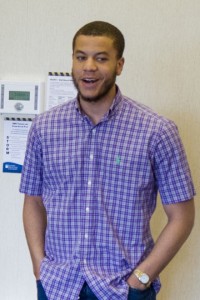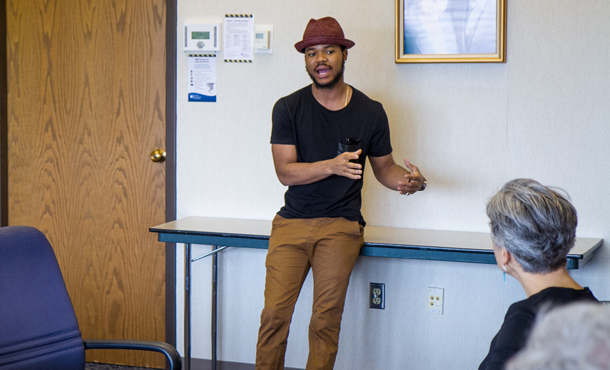By attending “Harrisonburg Startup Weekend,” Joshua Mensah and George Greene hoped to promote their clothing-design business. Instead, these digital design majors ended up hatching new business plans.
Working in teams among 24 competitors, including many experienced “serial entrepreneurs,” the two Eastern Mennonite University (EMU) juniors each pitched projects to help students connect online. Mensah won second prize for his plan in the 54-hour marathon competition, held at James Madison University (JMU) on April 5. The group-encouragement idea that Greene pitched didn’t win an award, but it did garner attention from JMU students for its creativity.
“Josh and George were so well-received. They really knocked the socks off the jury,” said EMU professor Anthony Smith, PhD, who teaches both students in his business topics course and served as a coach/mentor in the event.

Twelve days later, Mensah was named EMU’s nominee for the Governor’s Business Plan Challenge to be held May 2, 2013, in Richmond, Va. A panel of five independent judges convened by EMU’s department of business and economics chose Mensah’s business plan as the one “most likely to grow/succeed in 90 days,” an honor that came with $1,000 in prize money.
At Startup Weekend, underwritten by The Kauffman Foundation, participants suggested ideas, then formed six teams around the most popular suggestions. Each team had to turn their idea into a full-fledged business plan, and pitch it in five minutes to a panel of judges – a model employed at similar events in 3,500 communities globally, Smith noted.
Mensah, who is from Liberia, proposed a mobile app for students called “Vite-Us.” It could keep classmates informed of events, ranging from parties to performances to chapel services, he said.
Newcomers to campus find “it’s hard to keep up with what’s happening,” he added. His proposal would allow posting of all types of activities, on or off campus. Just-arrived first-year students might follow the site’s link to a campus map and reach their first “barbecue on the hill.”
After tying in an early round with more experienced competitors, Mensah considered dropping out until Dale Strickler, who belonged to a team heading to the sidelines, linked forces with Mensah, identified as one of the potential finalists. In previous years, Strickler had developed software for Rosetta Stone, a leading company for language-learning software. He is now pursuing an executive MBA at UVa’s Darden School. The duo divided up their work this way: Mensah provided creativity in graphics and vision for the business plan, while Strickler focused on its financial aspects and provided mobile app software expertise.
When teams fanned out on the JMU campus to survey students, they found enthusiasm for their Vite-Us pitch, even among visitors from high schools. “We put it on a Facebook page, and [soon] had 50 hits,” Mensah said.
“Anybody could post” on Vite-Us, Mensah suggested. Revenue sources, he said, might include charging students $2 or less to get the program on their iPhones. Businesses could pay to post events. Google ads could be solicited.
The two EMU students, Mensah and Greene, already operate a business, Dub Life LLC, matching classmates with printers and tailors for custom-made clothing. The plan presented at JMU by Greene, of Richmond, was for the formation of groups that would circulate as grassroots initiators of positive reinforcement, giving cheers and high fives, as part of “stepping up and being the Local Growl.”
EMU’s business topics class has centered around developing business plans, experiencing not only the dream of entrepreneurship but the background work, said junior Kate Steury, another student in Anthony Smith’s class. Steury, a liberal arts major, won $550 as “most promising entrepreneur” for her “Express Lane Deliveries, LLC” project in EMU’s business-plan competition.
